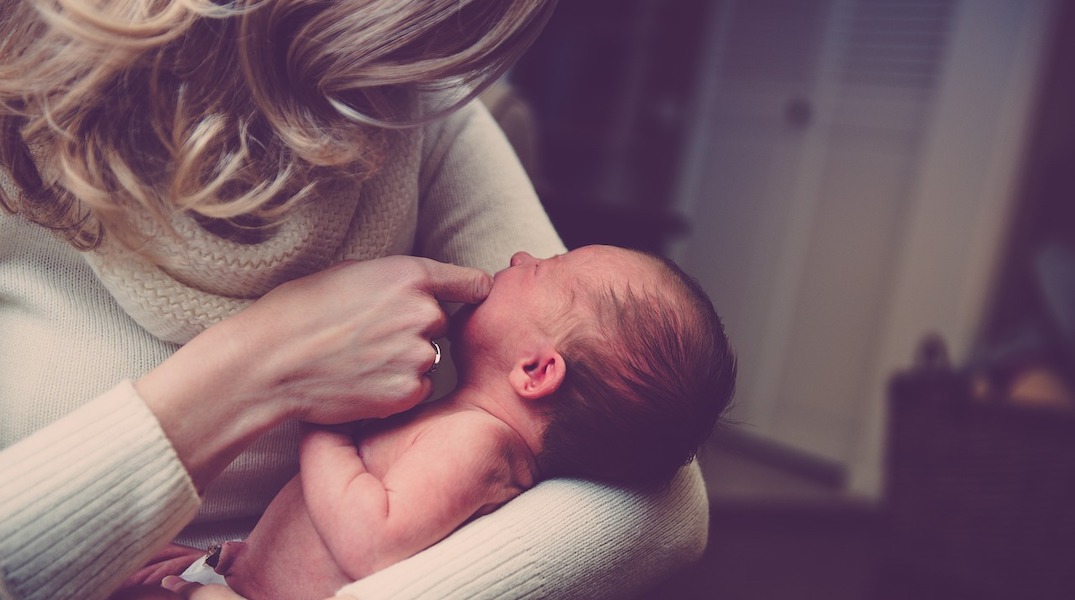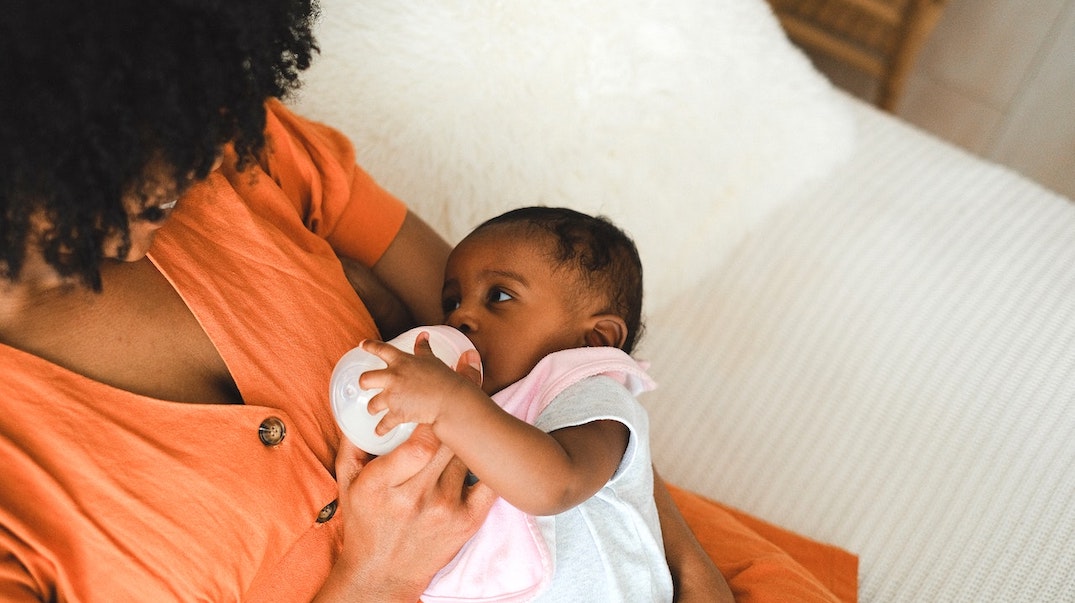Loss of Appetite Postpartum: Causes & Solutions
Women often report a sudden decline in their overall appetite in the days after giving birth. This phenomenon is generally temporary and resolves in the immediate postpartum period.
Almost all causes of appetite loss in the postpartum period are easily explained by the unique situation of having just given birth. Stress, pain, and hormonal changes can all affect your appetite. You may also have a loss of appetite for non-pregnancy-related issues, like medications or preexisting problems with an eating disorder.
If you experience a loss of appetite in the postpartum period, you may wonder if your baby is getting enough nutrition or if a serious health issue is going on. Fortunately, most new moms have no need to worry and can take simple steps to ensure their body is back on track regarding appetite and weight gain.
This guide goes over the causes of postpartum appetite loss, strategies to help you find relief, and more.

Get Postpartum Support from a Registered Dietitian
Insurance Accepted: 90% of Zaya Care patients pay $0 for visits with an RD
What causes loss of appetite postpartum?
After giving birth, most women are thinking about postpartum weight loss—how much weight they need to lose and how quickly they should try to do it.
However, many women don’t have the urge to eat or feel queasy. They may also feel aversions to specific foods, though this is less common. Instead, most feel only a vague lack of hunger, and these women worry about not eating enough.
In most cases, no appetite postpartum will be present regardless of whether you had a natural birth or cesarean section. There is a statistical increase in pain after a C-section compared to a vaginal birth; this means a greater chance of pain and the possibility of pain medications impacting appetite.
Let’s go over the various causes of having no appetite postpartum:
- Hormones. The pregnancy hormones, particularly estrogen and progesterone, interact with your brain to promote a bigger appetite during your pregnancy. These two hormones drop sharply when you deliver your baby. Without the pregnancy hormones, your appetite will diminish for a few days after giving birth until your body and brain reset themselves.
- Lack of sleep. Fatigue and sleep deprivation come on suddenly after giving birth as you have the need to care for your baby on a 24/7 basis. The lack of sleep and fatigue can interfere with your biological clock, temporarily interfering with your appetite.
- Stress. The stress of family, children, and caring for a newborn can all come together to cause the perfect storm of stress-related effects on your mind and body. One of these effects is that eating becomes less of a priority.
- Pain. Pain activates your fight-or-flight response so that you just don’t feel hungry. Simply being over-focused on pain means you put less emphasis on eating balanced meals.
- Postpartum anxiety or low mood. Feeling anxious about your new responsibilities is extremely common, even if you have other children. This kind of anxiety contributes to a reduced appetite. Low mood or baby blues affects more than half of all women after giving birth. This, too, can impact your appetite and eating habits in the first postpartum weeks.
- Medication. Medications needed after giving birth can suppress your appetite. If you need opioid/narcotic pain medication for pain, your appetite may be reduced. In addition, some selective serotonin reuptake inhibitor drugs (SSRIs) taken for anxiety or depression are likely to cause a reduced appetite. If you had a C-section and were prescribed pain medication, that may cause appetite loss, as well.
- Breastfeeding. If you are breastfeeding, you need to be prepared to eat more than if you’re bottle feeding. Unfortunately, the extra stress of figuring out how breastfeeding works on top of being sleep-deprived can contribute to a reduced appetite for the first few days after giving birth.
- Thyroid issues. Postpartum thyroiditis happens to as many as 8% of women who give birth. Your thyroid gland function can be overactive or underactive. An underactive thyroid can lead to a low mood, which can contribute to having a poor appetite. Overactive thyroid function can cause anxiety and reduced appetite as well.
- Something more serious. Poor appetite rarely means something serious in the days after giving birth; however, prolonged poor appetite associated with low mood or psychotic symptoms can mean postpartum depression or psychosis. If you have concerning and persistent symptoms of either depression or psychosis, talk to your healthcare provider as soon as you can to see if you need to do more to feel better.
Strategies to increase appetite after giving birth
Having a good postpartum diet helps your body heal and provides nutrition for your baby if you’re breastfeeding. This means getting enough calories for energy and for fueling your cells along with plenty of healthy nutrients (vitamins and minerals) to aid cellular processes.
If you’re struggling with reduced appetite, try these strategies:
- Eat smaller, more frequent meals. Even if you have little appetite, try eating a small snack. Plan on eating another small meal in two to three hours. This will allow you to snack throughout the day with about six small meals daily.
- Choose nutrient-dense foods. Nutrient-dense foods have lots of vitamins and minerals in them. When you eat them, you will get more nutrients in your diet, even when you do not eat as much. Foods that are nutrient-dense are dried fruits, nuts, seeds, starches (potatoes, rice, or sweet potatoes), and fish or meat.
- Avoid very strict diets. Strict diets are not recommended in the days after giving birth because the focus should be on healing and recovery.
- Switch up your meal prep. When you need energy and calories, try cooking in ways that add calories to your meals. Fried foods are higher in calories than boiled foods; however, too much fat might make your GI tract sluggish. Add butter, gravies, or sauces to help add calories to your meals.
- Choose new & exciting foods. This might be the time to celebrate having a baby by eating things you’ve always wanted to eat. Try take-out foods or home food delivery services that help make each meal different for you. If you’re nursing, you can learn more about foods to avoid while breastfeeding here.
- Make easy-to-eat meals. Make comfort foods that you would love to eat. They should be tasty and easy to prepare, if possible.
- Stay hydrated. Hydration is essential for your overall health after having a baby. If you are nursing, your hydration status matters even more. Try to drink at least two liters of water daily.
- Continue taking your prenatal vitamins. Your prenatal vitamin comes in handy for several reasons. Not only does it have the iron you need to build up your blood supply after giving birth, but you also gain nutrients you might not get in the foods you’re eating. With your prenatal vitamin supplying the vitamins you need, you are freer to eat foods with more energy (calories), even if they lack a lot of nutrients.
- Work with a postpartum nutritionist. If you are struggling to get enough to eat because of a loss of appetite, consider talking to a postpartum nutritionist. Your nutritionist can look at your diet and provide practical, individualized tips to help you overcome this problem and eat better. You can search for postpartum nutritionists that accept your insurance here.

Get Postpartum Support from a Registered Dietitian
Insurance Accepted: 90% of Zaya Care patients pay $0 for visits with an RD
Ask the Expert: Judy Singer, RDN
We asked Judy Singer, one of Zaya Care’s Registered Dietitians, how women can make sure they’re eating enough if they lack appetite postpartum. Here’s what she had to say:
Having just experienced the physical marathon of giving birth, it’s not uncommon to have a fluctuating appetite. If you’re struggling to get in your regular meals and snacks, there are a few strategies you can rely on.
First, keep lots of nuts on hand. Nuts are high in calories and full of healthy fats so a small amount goes a long way. They’re easy to grab and snack on throughout the day. Leave a bowl out on your counter so you can grab a handful while caring for your new baby.
Second, you can lean into a liquid diet if eating solids feels like too much. Think smoothies and soups, filled with nutrient-dense foods, like fruits, vegetables, nut butters, and avocado. These foods can also be made in large batches so you have them on hand for the week.
Finally, set reminders to keep yourself accountable. If the days are slipping away between feedings and diapers and you often forget to eat, set an alarm in your phone for every 3-4 hours reminding you to grab some food. Even if it’s a little something like a piece of fruit or a granola bar, it’s important that you’re getting in some nutrition every few hours.
How long does postpartum appetite loss usually last?
Most causes of loss of appetite in the postpartum period resolve on their own or are easy to overcome. When your hormones are to blame, your appetite is likely to return within a week or so of having your baby. If other factors are present, such as pain, stress, or sleep deprivation, appetite loss may improve more slowly.
If you find yourself with reduced appetite two weeks or more after giving birth, particularly if you believe that anxiety, depression, or a more severe case of the “baby blues” is a factor, then you should talk to your healthcare provider about what more you can do to regain your appetite.
You can learn more about postpartum anxiety treatment and postpartum depression therapy in these articles.
Alternatively, you may want to consider working with a professional. If you’re interested, we can match you with a postpartum mental health therapist that accepts your insurance here at Zaya Care.
How much you need to eat for breastfeeding & complications of not eating enough
How much should you be eating after having a baby? This depends on whether or not you are breastfeeding.
Breastfeeding moms need to pay attention to hydration, calorie intake, and nutrient intake. To attain these three things, make sure you have a balanced diet with adequate amounts of vitamins and minerals.
The foods that best provide the nutrients you need include the following items:
- Fruits. Fruits have many vitamins and phytonutrients that help enhance cellular function.
- Vegetables. Vegetables can be rich in iron, vitamins, and other phytonutrients.
- Whole grains. Whole grains provide starches to help provide a steady fuel source in your diet. When you choose whole grains, you will get more nutrients from these foods than if you choose processed grains. Whole-grain bread, cereals, rice, and pasta are all good food choices in this category.
- Meats and fish. Healthy meat choices are lean and free of added hormones. Choose lean poultry and pork products that have little visible fat on them. Fish is excellent as long as you choose low-mercury fish.
- Dairy. Dairy products like milk, cream, yogurt, and even ice cream can add calories, calcium, and vitamin D you will need for you and your baby’s optimal health.
If you aren’t breastfeeding, you still need these nutrients to recover and regain your health after having a baby. Breastfeeding moms need about 330 to 400 calories more per day than women who aren’t breastfeeding. If not breastfeeding, eat about 1600 to 2400 calories daily.
The calories and nutrients you eat help your body heal after giving birth. If you don’t get enough, you risk extreme fatigue, a poor immune system, and complications that include wound infections, endometritis, and other types of infection.
In addition, there is a greater risk of postpartum depression among women with poor diet quality.
How working with a postpartum nutritionist can help with appetite loss after giving birth
Because your postpartum diet matters to your and your baby’s optimal health, you may wish to talk to a postpartum nutritionist. A postpartum nutritionist is a specialist in nutrition who also has training in the management of nutritional issues during and after pregnancy.
Your postpartum nutritionist can meet with you one or more times to evaluate your diet and make individualized recommendations on how you can eat more and better food despite having a poor appetite. They have experience with this issue and can help direct you toward seeking help if the appetite loss lasts more than the expected one to two weeks.
If you’re interested in finding help, we can match you with a postpartum nutritionist that accepts your insurance here at Zaya Care.

Get Postpartum Support from a Registered Dietitian
Insurance Accepted: 90% of Zaya Care patients pay $0 for visits with an RD
Women often report a sudden decline in their overall appetite in the days after giving birth. This phenomenon is generally temporary and resolves in the immediate postpartum period.
Almost all causes of appetite loss in the postpartum period are easily explained by the unique situation of having just given birth. Stress, pain, and hormonal changes can all affect your appetite. You may also have a loss of appetite for non-pregnancy-related issues, like medications or preexisting problems with an eating disorder.
If you experience a loss of appetite in the postpartum period, you may wonder if your baby is getting enough nutrition or if a serious health issue is going on. Fortunately, most new moms have no need to worry and can take simple steps to ensure their body is back on track regarding appetite and weight gain.
This guide goes over the causes of postpartum appetite loss, strategies to help you find relief, and more.

Get Postpartum Support from a Registered Dietitian
Insurance Accepted: 90% of Zaya Care patients pay $0 for visits with an RD
What causes loss of appetite postpartum?
After giving birth, most women are thinking about postpartum weight loss—how much weight they need to lose and how quickly they should try to do it.
However, many women don’t have the urge to eat or feel queasy. They may also feel aversions to specific foods, though this is less common. Instead, most feel only a vague lack of hunger, and these women worry about not eating enough.
In most cases, no appetite postpartum will be present regardless of whether you had a natural birth or cesarean section. There is a statistical increase in pain after a C-section compared to a vaginal birth; this means a greater chance of pain and the possibility of pain medications impacting appetite.
Let’s go over the various causes of having no appetite postpartum:
- Hormones. The pregnancy hormones, particularly estrogen and progesterone, interact with your brain to promote a bigger appetite during your pregnancy. These two hormones drop sharply when you deliver your baby. Without the pregnancy hormones, your appetite will diminish for a few days after giving birth until your body and brain reset themselves.
- Lack of sleep. Fatigue and sleep deprivation come on suddenly after giving birth as you have the need to care for your baby on a 24/7 basis. The lack of sleep and fatigue can interfere with your biological clock, temporarily interfering with your appetite.
- Stress. The stress of family, children, and caring for a newborn can all come together to cause the perfect storm of stress-related effects on your mind and body. One of these effects is that eating becomes less of a priority.
- Pain. Pain activates your fight-or-flight response so that you just don’t feel hungry. Simply being over-focused on pain means you put less emphasis on eating balanced meals.
- Postpartum anxiety or low mood. Feeling anxious about your new responsibilities is extremely common, even if you have other children. This kind of anxiety contributes to a reduced appetite. Low mood or baby blues affects more than half of all women after giving birth. This, too, can impact your appetite and eating habits in the first postpartum weeks.
- Medication. Medications needed after giving birth can suppress your appetite. If you need opioid/narcotic pain medication for pain, your appetite may be reduced. In addition, some selective serotonin reuptake inhibitor drugs (SSRIs) taken for anxiety or depression are likely to cause a reduced appetite. If you had a C-section and were prescribed pain medication, that may cause appetite loss, as well.
- Breastfeeding. If you are breastfeeding, you need to be prepared to eat more than if you’re bottle feeding. Unfortunately, the extra stress of figuring out how breastfeeding works on top of being sleep-deprived can contribute to a reduced appetite for the first few days after giving birth.
- Thyroid issues. Postpartum thyroiditis happens to as many as 8% of women who give birth. Your thyroid gland function can be overactive or underactive. An underactive thyroid can lead to a low mood, which can contribute to having a poor appetite. Overactive thyroid function can cause anxiety and reduced appetite as well.
- Something more serious. Poor appetite rarely means something serious in the days after giving birth; however, prolonged poor appetite associated with low mood or psychotic symptoms can mean postpartum depression or psychosis. If you have concerning and persistent symptoms of either depression or psychosis, talk to your healthcare provider as soon as you can to see if you need to do more to feel better.
Strategies to increase appetite after giving birth
Having a good postpartum diet helps your body heal and provides nutrition for your baby if you’re breastfeeding. This means getting enough calories for energy and for fueling your cells along with plenty of healthy nutrients (vitamins and minerals) to aid cellular processes.
If you’re struggling with reduced appetite, try these strategies:
- Eat smaller, more frequent meals. Even if you have little appetite, try eating a small snack. Plan on eating another small meal in two to three hours. This will allow you to snack throughout the day with about six small meals daily.
- Choose nutrient-dense foods. Nutrient-dense foods have lots of vitamins and minerals in them. When you eat them, you will get more nutrients in your diet, even when you do not eat as much. Foods that are nutrient-dense are dried fruits, nuts, seeds, starches (potatoes, rice, or sweet potatoes), and fish or meat.
- Avoid very strict diets. Strict diets are not recommended in the days after giving birth because the focus should be on healing and recovery.
- Switch up your meal prep. When you need energy and calories, try cooking in ways that add calories to your meals. Fried foods are higher in calories than boiled foods; however, too much fat might make your GI tract sluggish. Add butter, gravies, or sauces to help add calories to your meals.
- Choose new & exciting foods. This might be the time to celebrate having a baby by eating things you’ve always wanted to eat. Try take-out foods or home food delivery services that help make each meal different for you. If you’re nursing, you can learn more about foods to avoid while breastfeeding here.
- Make easy-to-eat meals. Make comfort foods that you would love to eat. They should be tasty and easy to prepare, if possible.
- Stay hydrated. Hydration is essential for your overall health after having a baby. If you are nursing, your hydration status matters even more. Try to drink at least two liters of water daily.
- Continue taking your prenatal vitamins. Your prenatal vitamin comes in handy for several reasons. Not only does it have the iron you need to build up your blood supply after giving birth, but you also gain nutrients you might not get in the foods you’re eating. With your prenatal vitamin supplying the vitamins you need, you are freer to eat foods with more energy (calories), even if they lack a lot of nutrients.
- Work with a postpartum nutritionist. If you are struggling to get enough to eat because of a loss of appetite, consider talking to a postpartum nutritionist. Your nutritionist can look at your diet and provide practical, individualized tips to help you overcome this problem and eat better. You can search for postpartum nutritionists that accept your insurance here.

Get Postpartum Support from a Registered Dietitian
Insurance Accepted: 90% of Zaya Care patients pay $0 for visits with an RD
Ask the Expert: Judy Singer, RDN
We asked Judy Singer, one of Zaya Care’s Registered Dietitians, how women can make sure they’re eating enough if they lack appetite postpartum. Here’s what she had to say:
Having just experienced the physical marathon of giving birth, it’s not uncommon to have a fluctuating appetite. If you’re struggling to get in your regular meals and snacks, there are a few strategies you can rely on.
First, keep lots of nuts on hand. Nuts are high in calories and full of healthy fats so a small amount goes a long way. They’re easy to grab and snack on throughout the day. Leave a bowl out on your counter so you can grab a handful while caring for your new baby.
Second, you can lean into a liquid diet if eating solids feels like too much. Think smoothies and soups, filled with nutrient-dense foods, like fruits, vegetables, nut butters, and avocado. These foods can also be made in large batches so you have them on hand for the week.
Finally, set reminders to keep yourself accountable. If the days are slipping away between feedings and diapers and you often forget to eat, set an alarm in your phone for every 3-4 hours reminding you to grab some food. Even if it’s a little something like a piece of fruit or a granola bar, it’s important that you’re getting in some nutrition every few hours.
How long does postpartum appetite loss usually last?
Most causes of loss of appetite in the postpartum period resolve on their own or are easy to overcome. When your hormones are to blame, your appetite is likely to return within a week or so of having your baby. If other factors are present, such as pain, stress, or sleep deprivation, appetite loss may improve more slowly.
If you find yourself with reduced appetite two weeks or more after giving birth, particularly if you believe that anxiety, depression, or a more severe case of the “baby blues” is a factor, then you should talk to your healthcare provider about what more you can do to regain your appetite.
You can learn more about postpartum anxiety treatment and postpartum depression therapy in these articles.
Alternatively, you may want to consider working with a professional. If you’re interested, we can match you with a postpartum mental health therapist that accepts your insurance here at Zaya Care.
How much you need to eat for breastfeeding & complications of not eating enough
How much should you be eating after having a baby? This depends on whether or not you are breastfeeding.
Breastfeeding moms need to pay attention to hydration, calorie intake, and nutrient intake. To attain these three things, make sure you have a balanced diet with adequate amounts of vitamins and minerals.
The foods that best provide the nutrients you need include the following items:
- Fruits. Fruits have many vitamins and phytonutrients that help enhance cellular function.
- Vegetables. Vegetables can be rich in iron, vitamins, and other phytonutrients.
- Whole grains. Whole grains provide starches to help provide a steady fuel source in your diet. When you choose whole grains, you will get more nutrients from these foods than if you choose processed grains. Whole-grain bread, cereals, rice, and pasta are all good food choices in this category.
- Meats and fish. Healthy meat choices are lean and free of added hormones. Choose lean poultry and pork products that have little visible fat on them. Fish is excellent as long as you choose low-mercury fish.
- Dairy. Dairy products like milk, cream, yogurt, and even ice cream can add calories, calcium, and vitamin D you will need for you and your baby’s optimal health.
If you aren’t breastfeeding, you still need these nutrients to recover and regain your health after having a baby. Breastfeeding moms need about 330 to 400 calories more per day than women who aren’t breastfeeding. If not breastfeeding, eat about 1600 to 2400 calories daily.
The calories and nutrients you eat help your body heal after giving birth. If you don’t get enough, you risk extreme fatigue, a poor immune system, and complications that include wound infections, endometritis, and other types of infection.
In addition, there is a greater risk of postpartum depression among women with poor diet quality.
How working with a postpartum nutritionist can help with appetite loss after giving birth
Because your postpartum diet matters to your and your baby’s optimal health, you may wish to talk to a postpartum nutritionist. A postpartum nutritionist is a specialist in nutrition who also has training in the management of nutritional issues during and after pregnancy.
Your postpartum nutritionist can meet with you one or more times to evaluate your diet and make individualized recommendations on how you can eat more and better food despite having a poor appetite. They have experience with this issue and can help direct you toward seeking help if the appetite loss lasts more than the expected one to two weeks.
If you’re interested in finding help, we can match you with a postpartum nutritionist that accepts your insurance here at Zaya Care.

Get Postpartum Support from a Registered Dietitian
Insurance Accepted: 90% of Zaya Care patients pay $0 for visits with an RD
















